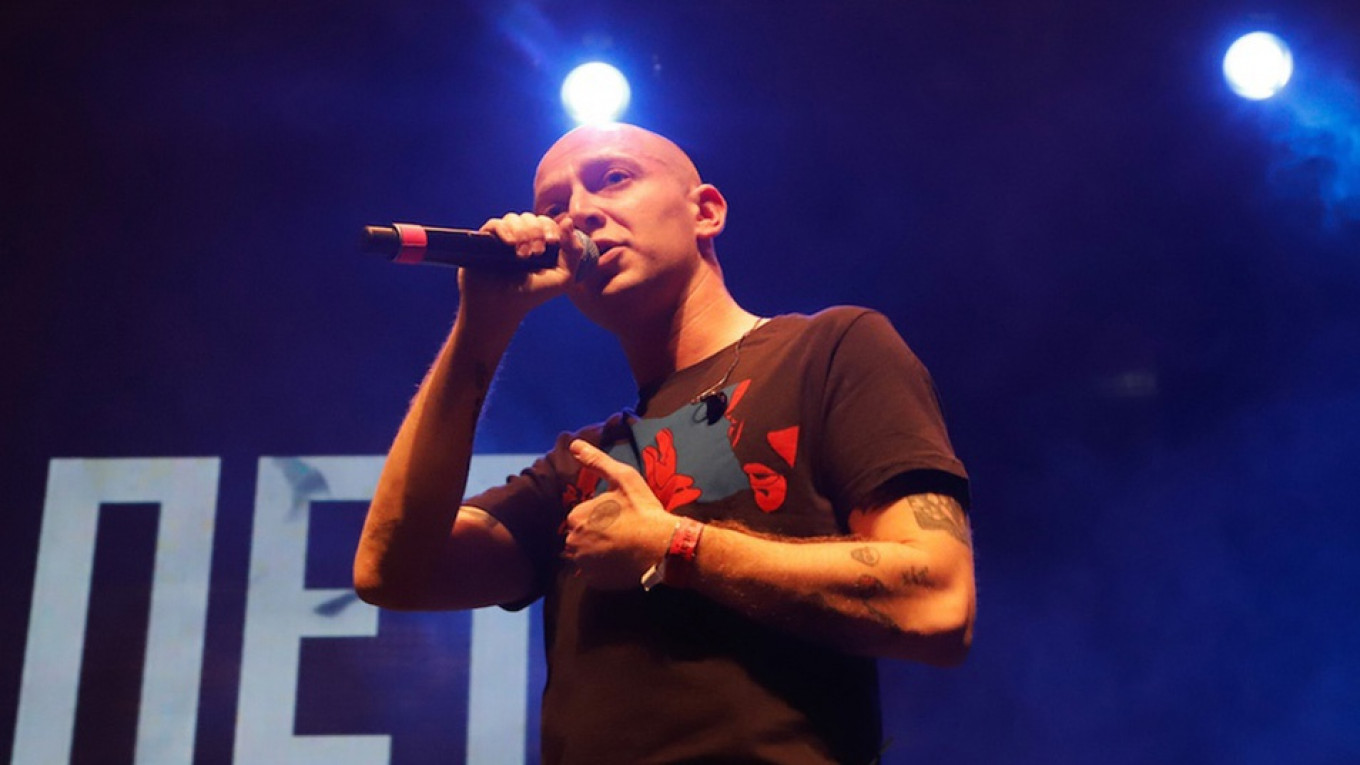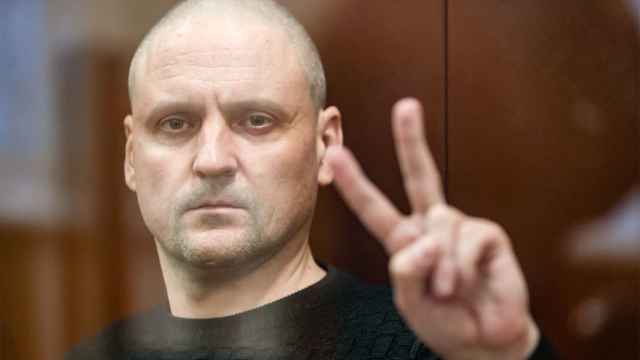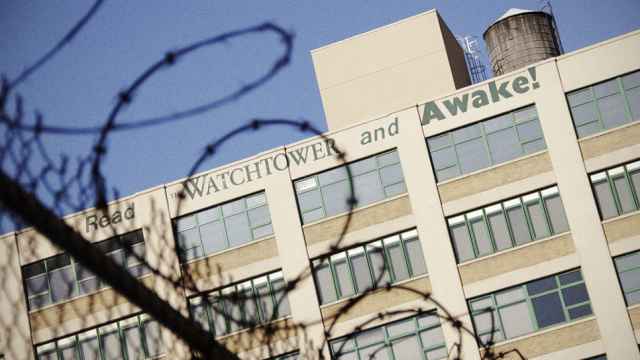Unannounced fire safety inspections. Last-minute bomb threats. Pressured club owners. These are just some of the measures the IC3PEAK techno group says the authorities have used to cancel their concerts over the past week since the start of their month-long tour around Russia.
In one instance, the Moscow-based group says they were even told directly to leave town.
After three attempts to hold a concert in the Urals city of Perm on Tuesday were thwarted, the musicians say that members of the Federal Security Service (FSB) demanded they leave. The musicians refused but, they say, security officers tailed them until they left by train the next morning.
“They’re treating us as if we are some kind of criminals,” Nastya Kreslina, a member of the group, said in a joint phone interview on Thursday with her bandmate Nikolai Kostylev.
The musicians spoke to The Moscow Times from Yekaterinburg, another Urals city where they were scheduled to perform as part of the next stop on their tour. They were waiting to find out from local police if their concert would be allowed to go ahead as planned that evening. Two of the upcoming stops on their tour had already been canceled.
Kreslina and Kostylev, who said they are in their 20s but would not give their exact ages, have not officially been charged with any crimes. But they have been caught up in an increasing wave of restrictions against musicians in Russia, including concert cancellations and bans on music videos and songs over indecent lyrics and alleged extremism.
The restrictions have affected artists across a range of genres, including some of Russia’s most popular artists: Allj, whose 2017 hit “Pink Wine” has been viewed over 176 million times on YouTube, and pop star Monetochka, whose last album took Russia by storm this summer. Other affected artists include the rappers Matrang, Jah Kahlib and HammAli & Navai, as well as the pop-punk group Friendzona.
One popular rapper, Husky, even ended up in prison last Thursday. He had climbed atop a car parked outside a concert venue after a show he had been scheduled to hold was abruptly canceled without explanation and performed for his fans. The punishment: 12 days behind bars for hooliganism and refusing to take a drug test.
The view of musicians as having a negative influence on society is not new in Russia: Local officials and law enforcement, backed by vigilante and parents groups that support traditional values, have long gone after artists that they believe promote narcotics, sex, suicide or other social ills.
But experts say that the recent wave that has swept across the country, particularly over the past weeks, stands out.
“This always happened from time to time, but the number of stories coming out this month is unique,” says Alexander Gorbachev, who covers the music scene for the Meduza news outlet. “Every day another artist is targeted.”
In a phone interview, David Shelter, a Perm-based club promoter who worked with IC3PEAK when they visited, described the fall tour season that started in September as “very strange.” Police have called Shelter in for questionings about IC3PEAK, Friendzona and Husky this month, and he was even paid a visit by Alexander Kosenkov, the head of a district in Perm, several days before IC3PEAK’s scheduled show, Shelter says.
“He said, ‘We don’t recommend that you hold this concert. They have suspicious lyrics,’” Shelter, 28, recalled. “I am a law-abiding person. If it was illegal to promote these groups, then I wouldn’t have.”
“But I have never been shown any documentation that would stop me from doing so,” he added.
Pavel Chikov, the director of the Agora international human rights group that has advised many of the affected musicians, says that local law enforcement officials rarely provide evidence to back up any illegal activity. Chikov has claimed that the FSB headquarters in Moscow has a “blacklist” of musicians “whose concerts are to be banned in Russia’s regions.”
The FSB did not respond to a request for comment for this story.
Alexander Verkhovsky, the director of the Moscow-based SOVA Center which tracks extremism, says the FSB and the “Center E” counter-extremism police unit have increasingly taken a “preventative approach” this year.
“They have widened their scope to try to stop anything that could radicalize the youth,” Verkhovsky said.
In an interview, Chikov said that he could not offer “additional details about the blacklist at this time.” He did, however, note that two attacks carried out by teenage assailants in October — on a school in Crimea and an FSB building in the city of Arkhangelsk — had lit a fire under Russia’s security services in their drive to clamp down on potential extremism.
According to Chikov, part of that work has been figuring out “where [the youth] go, what they’re interested in, what they watch, what they listen to and who their leaders are.”
When opposition politician Alexei Navalny drew thousands of youth to street protests in March 2017, Chikov says the authorities were taken by surprise and realized they did not have a handle on the new generation. Since then, he says, they have been scrambling to catch up.
On Thursday, the Znak news website reported that the FSB and the extremism unit were now zeroing in on music. Based on sources close to President Vladimir Putin’s administration, the report claimed that, after the October attacks, the security agencies started tracking which artists young people follow on social media and which songs they post on their pages.
Yury Saprykin, a cultural commentator, says they would have found musicians that are very young, have only burst onto the scene recently and are widely popular. “So, of course, all teenagers are listening to these artists, whether the teenagers are extremist or not,” he said.
The wide-sweeping approach the authorities have taken reminds music critic Artemy Troitsky of the perestroika period of the Soviet Union in the 1980s, when rock concerts were mostly banned over fears that they would corrupt the youth.
Troitsky believes the approach will backfire. “Most of these musicians are not even close to politics,” he said. “While some of them are, others have begun to follow in their stead, and I think that now it may start becoming the trend, just like during the Soviet period.”
This week, there were hints that the trend may be taking hold.
On Monday, one of the country’s most popular rap stars, Oxxxymiron, along with fellow stars Noize MC and Basta, organized a concert in support of Husky. The concert, attended by Navalny, raised around 6 million rubles ($90,000) to help cover the funds that Husky had lost as a result of the concerts he was forced to cancel after his detention.
But Husky announced that he would not be keeping the money for himself. Instead, he said that the funds would go to Agora, the liberal Open Russia movement, the Pussy Riot-funded Mediazona news site and musicians facing the cancellation of their own concerts, including IC3PEAK.
If orders to ban certain musicians are coming from the top, not everyone seems to be pleased.
On Thursday, Sergei Naryshkin, the head of Russia’s Foreign Intelligence Service (SVR) and chairman of Russia’s Organizing Committee for the support of Literature, Book Publishing and Reading, seemed to have offered an olive branch when he proposed that the Culture Ministry establish grant programs to support local rappers.
And earlier this week, several members of the Putin administration were reportedly heated when they found out about Husky’s arrest and demanded that he be released earlier — which he was, on Monday.
For their part, the IC3PEAK duo said they were determined to continue their tour, despite the prospect of more canceled shows. “Censorship will win if we don’t go to the end,” Kostylev said.
His bandmate Kreslina added: “Our example will be important for others. We were not the first, and we won’t be the last.”
A Message from The Moscow Times:
Dear readers,
We are facing unprecedented challenges. Russia's Prosecutor General's Office has designated The Moscow Times as an "undesirable" organization, criminalizing our work and putting our staff at risk of prosecution. This follows our earlier unjust labeling as a "foreign agent."
These actions are direct attempts to silence independent journalism in Russia. The authorities claim our work "discredits the decisions of the Russian leadership." We see things differently: we strive to provide accurate, unbiased reporting on Russia.
We, the journalists of The Moscow Times, refuse to be silenced. But to continue our work, we need your help.
Your support, no matter how small, makes a world of difference. If you can, please support us monthly starting from just $2. It's quick to set up, and every contribution makes a significant impact.
By supporting The Moscow Times, you're defending open, independent journalism in the face of repression. Thank you for standing with us.
Remind me later.







